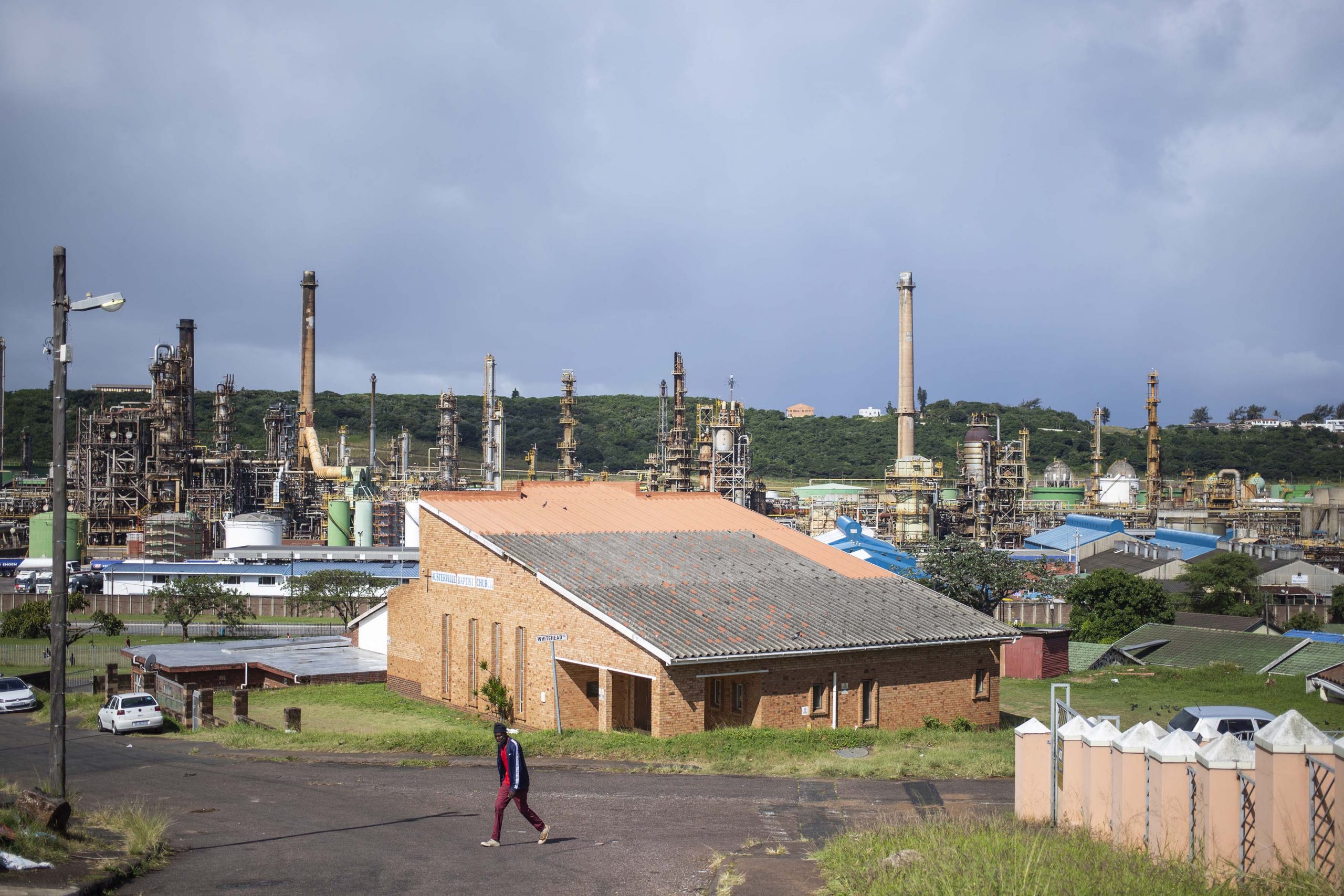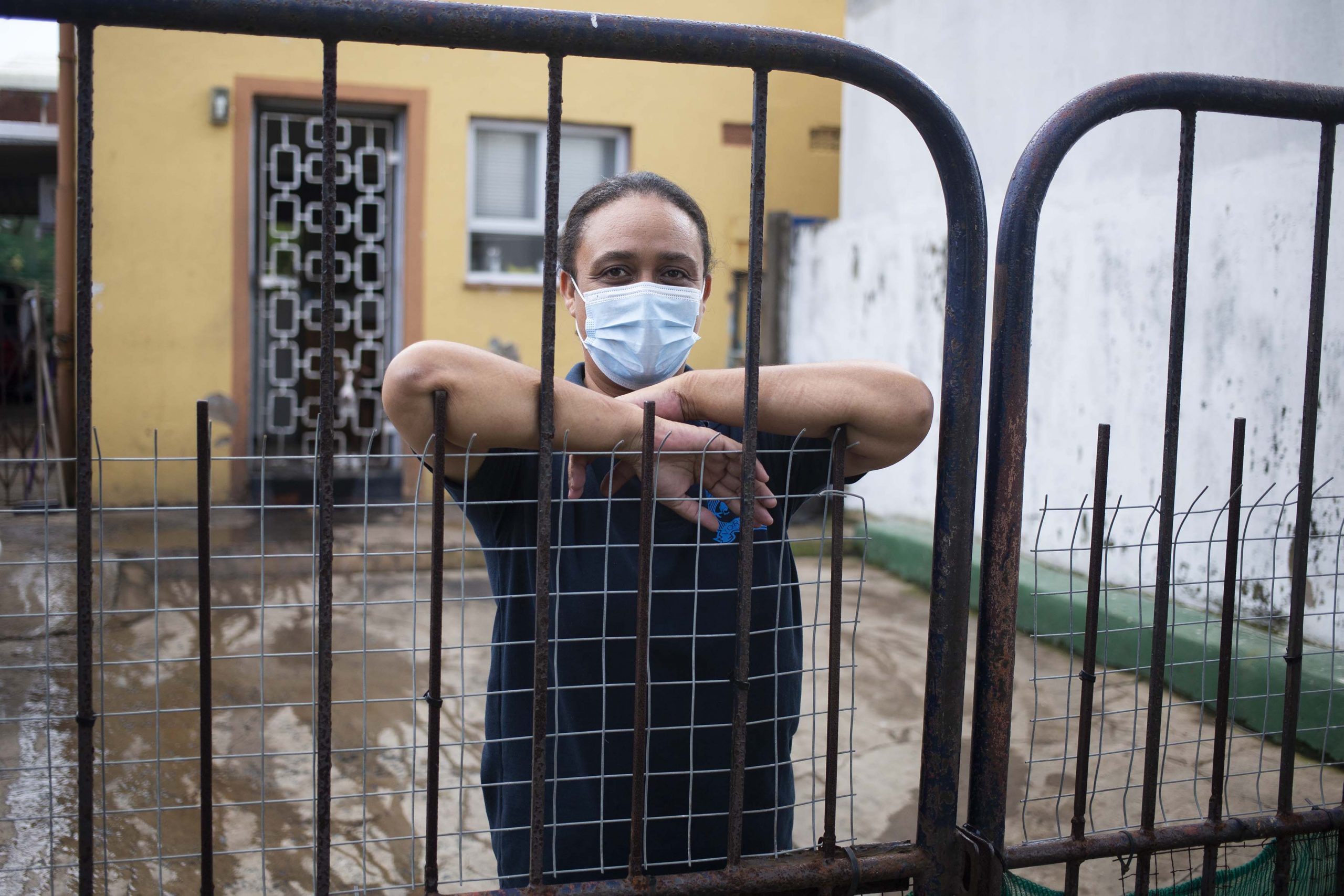Residents breathe easier as Engen refinery to close
Long-suffering South Durban Basin communities have welcomed the decision to convert the oil refinery to a storage facility but activists worry the polluting will continue.
Author:
17 June 2021

Residents of South Durban Basin will breathe a sigh of relief in 2023 when the notorious Engen refinery converts its oil-refining facility into a petroleum storage terminal.
Though the conversion will likely come with job losses – Engen employs 650 full-time workers and several hundred contractors – the health benefits will be enormous for residents of Wentworth, Merebank, Jacobs, Bluff, Clairwood, Lamontville, Umlazi, Isipingo and the surrounding areas of Durban’s industrial hub.
The refinery’s managing director and chief executive, Yusa’ Hassan, says the decision to convert the plant from a refinery to a terminal was based on a strategic valuation study that showed the facility, South Africa’s third largest, was no longer financially viable.


“The Engen refinery cannot move forward in its current structure. We must safeguard the long-term sustainability of the Engen business; therefore, we are proceeding with the conversion to a terminal,” says Hassan. “It is our firm intention to preserve as many [jobs] as possible. We are initiating a reskilling and retooling programme, as well as evaluating the potential for some employees to be redeployed to other parts of the … organisation.”
The Engen refinery was commissioned in 1954, and had a crude refining capacity of 15 000 barrels per day when it opened. When it closed in December 2020, after another terrible explosion, it was producing 135 000 barrels. Over the years, the facility has raked in billions for its owners.
The news of the refinery conversion has been welcomed by residents of the area. For more than five decades they have been protesting and picketing the plant, which emits toxic chemicals and occasionally violently explodes, raining petrol, fire and debris onto those who live in the surrounding suburbs.
Belching fumes and raining fire
Environmental and health experts say toxic fumes cause asthma, cancers and respiratory diseases, of which there is a higher-than-average incidence in the area. Basil Underwood, 58, has been living on Tara Road opposite the Engen oil refinery’s entrance since his family moved there in 1968. He says every day residents bear the brunt of explosions and hazardous emissions from the plant.
Underwood’s wife, Bernadine, 40, developed asthma 10 years ago and her condition has become worse, especially at night. “We will be very happy when they remove this eyesore from here,” she says, pointing at the refinery.
Her neighbour Alison Roberts, 43, a primary school teacher, is also asthmatic. She was in the house with her children when the December 2020 explosion occurred. “I thought it was an earthquake. The walls and roof were trembling. The kids were playing outside and it was only when I rushed to grab them that I saw there were huge flames and smoke in the refinery,” she says.
Several workers and six residents were hospitalised and treated for smoke inhalation after the blast. “We have endured these types of blasts and explosions for many years. Even at night we cannot sleep because trucks are going up and down the road,” Roberts says.
The impact and sound of the blast was felt several kilometres away as roads, roofs and foundations of buildings were shaken. A huge fire broke out at the refinery and thick black smoke billowed for hours as emergency personnel tried to get it under control.
An 11-year-old girl suffered burns at Block 10 in Wentworth. The six apartments in the block occupied by families had to be evacuated after burning chemicals from the refinery destroyed the roof. Residents also inhaled harmful gases.


Trishia Smith, 21, was in the block of flats when they caught fire. She says she was in the bathroom getting ready for work when a burning bolt flew across her apartment. “Suddenly, I couldn’t see anything. My mother was screaming in the next room saying we must get out. The dark fumes were in the air. I struggled to breathe. When we finally managed to get out of the flat we realised that the bolt entered the flat through our neighbour’s roof. It was so scary,” Smith says.
Whenever she looks at the refinery, her whole body trembles. “This place … always brings bad memories. It would be good if they can remove this refinery from here.”
Another serious blast occurred in October 2011 after a crude oil distillation unit caught fire. As a result of that explosion, 101 children from Settlers Primary School in Merebank and 10 adults were rushed to the Wentworth Hospital after being splattered with airborne droplets of crude oil and a cloud of smoke and soot from the refinery. Many struggled for breath while others complained of itchy skin and eyes, dizziness and headaches.
More than two dozen children were treated with allergy medication, headache pills or calamine lotion, while two were nebulised for breathing problems. Afterwards, Engen paid to have a pollution testing centre placed at Settlers Primary.
Environmental activists say the Engen refinery is not the only culprit in the area. About 10km south of the Engen facility is the oil refinery plant for Shell and BP South African Petroleum Refineries (SAPREF), supplier of 35% of the country’s petrochemical and oil needs. The Mondi and Sappi paper plants also contribute to toxic emissions. According to the South Durban Community Environmental Alliance (SDCEA), altogether South Durban Basin has more than 300 smoke stacks or industrial-scale chimneys emitting dangerous chemicals.
The area is also en route to the Durban port, one of the largest on the African continent. Trucks loading and off-loading cargo pass through South Durban Basin, causing traffic congestion, emissions and noise for residents.
More potential pollution
These companies provide thousands of high-paying jobs for the people of Durban and the surrounding towns. But SDCEA thinks job opportunities should be balanced against health for communities and the protection of the environment. SDCEA is an environmental and justice advocacy group made up of 19 affiliate organisations and has been actively opposing the pollutants emitted by these factories since its formation in 1995.
SDCEA says it has recorded 55 major industrial explosions and incidents in South Durban Basin from 2000 to 2016. At least two of these took place in the SAPREF oil refinery and a whopping 18 at the 67-year-old Engen refinery.
After the last Engen refinery explosion on 4 December 2020, the Department of Environmental Affairs ordered it to halt all activity until a full investigation by an independent panel of experts into the cause of the explosion had been completed. This investigation is still underway.
Environmental activists explain that though explosions are obviously dangerous to the community, pollution poses an even greater problem. Air monitoring stations are operational, but according to Bongani Mthembu, SDCEA’s senior air quality and geographic information system officer, “there are concerns and questions around the accuracy of the data being produced by these stations”.


One of the officials at Settlers Primary School, who asked not to be named for fear of retribution, says neither the school nor its surrounding neighbourhoods have access to the data collected from the pollution testing centre there.
“We are not told anything. Officials [tell] us … the system with which they collate data is computerised and if we or anybody else wants the information, we have to go through the eThekwini Municipality’s official channels. We are worried because we were not even told about a promised evacuation plan should another explosion occur. These petro-giants have a lot of money and they operate in secrecy,” the official says.
Mthembu says South Durban is home to about half a million people who suffer the legacy of apartheid planning. Mostly impoverished Black people live close to the polluting industries.
He says environmental activists and organisations pressured the government and petrochemical companies to enact the groundbreaking National Environment Management: Air Quality Act 39 of 2004, which provided for “national norms and standards regulating air quality monitoring, management and control by all spheres of government”.
But, despite these laws, Mthembu says large conglomerates were able to use the lack of regulatory capacity of the government to get away with murder. “But we … have been vocal in our protests and pickets in opposition to these companies, that is why … companies like Engen are reconsidering their positions and options,” he says.
Conversion no solution
But SDCEA is not happy the Engen refinery is turning into a storage facility. “We are of the view that the [surrounding neighbourhoods] have suffered enough already and this site should be demolished completely and reused as a light-industrial area with a strong community-empowering emphasis. This would ensure that locals benefit,” Mthembu says.
Rajen Naidoo, head of the University of KwaZulu-Natal’s occupational and environmental health department, says he is also sceptical of Engen’s plan to change the site. “I would like to see the [environmental impact assessment] application and see what it entails. This is because we could well replace one type of pollutant with another.”
“If companies are polluting the atmosphere, they should take responsibility,” Naidoo adds.
Msawakhe Mayisela, eThekwini Municipality spokesperson, disputed the assertion from residents, environmental organisations and academics that information from air quality centres is kept secret. “The Information from the eThekwini Air Quality Monitoring stations is freely available on the [South African air quality information system] website. Engen does, however, conduct its own ‘fenceline’ monitoring. Engen does make this information available at its community meetings, [but] not all community members attend these forums and may therefore not be aware of this information sharing.”


He added that “from a health perspective … a number of environmental authorisations will be required to decommission the refinery and erect a tank farm”.
Residents say it was difficult during the hard lockdown because they were barred from going out of their homes while being subject to “smelly fumes and chemicals”.
Manesh Singh, 60, who lives on the same road as the refinery and has a stand where he sells fruit and vegetables, says the air pollution and the strange smells have decreased since the December explosion.
“But you still see fumes at night,” says Singh. “We have heard that the refinery might close down. But I have been here for so long that I don’t believe it will actually happen. I will only believe it when I see it happening.”
